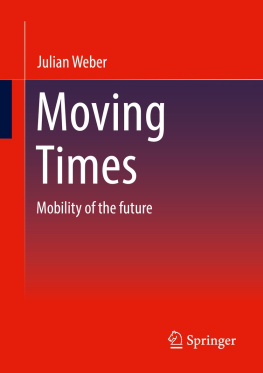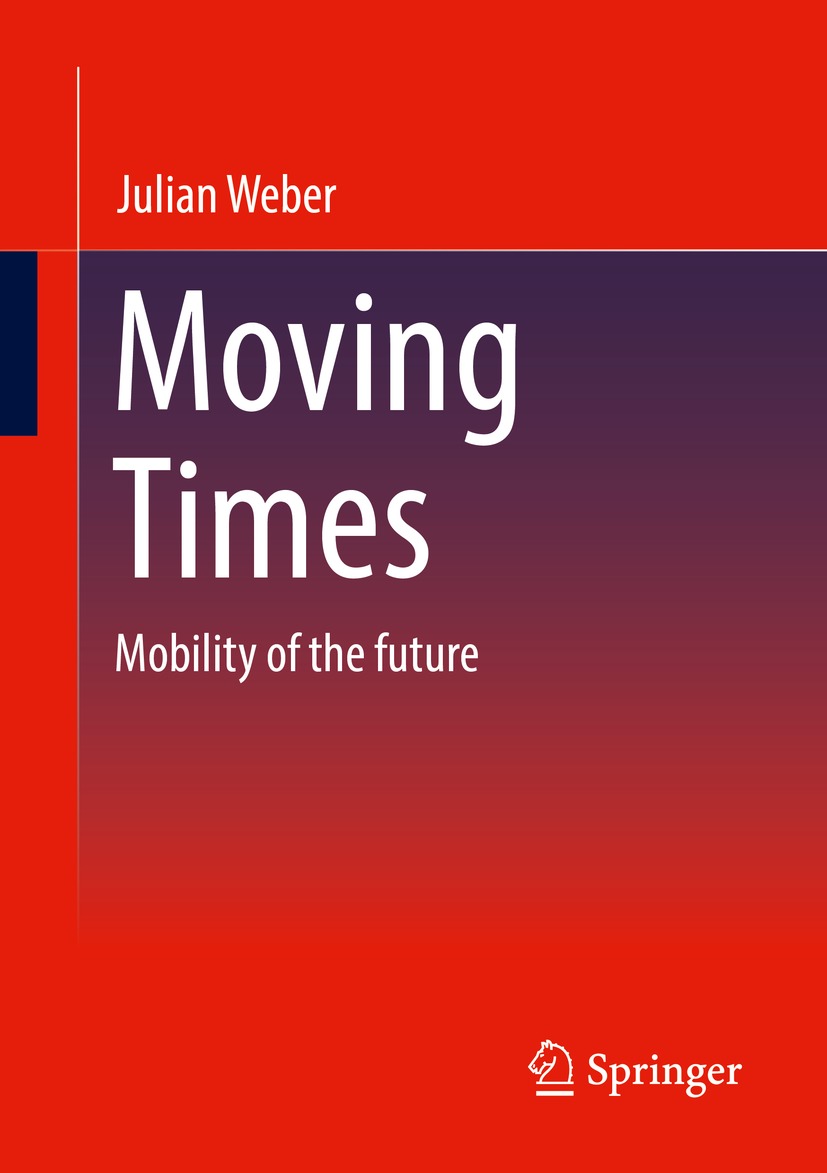Julian Weber
Munich, Germany
ISBN 978-3-658-37732-8 e-ISBN 978-3-658-37733-5
https://doi.org/10.1007/978-3-658-37733-5
This book is a translation of the original German edition Bewegende Zeiten by Weber, Julian, published by Springer Fachmedien Wiesbaden GmbH in 2020. The translation was done with the help of artificial intelligence (machine translation by the service DeepL.com). A subsequent human revision was done primarily in terms of content, so that the book will read stylistically differently from a conventional translation. Springer Nature works continuously to further the development of tools for the production of books and on the related technologies to support the authors.
The Editor(s) (if applicable) and The Author(s), under exclusive license to Springer Fachmedien Wiesbaden GmbH, part of Springer Nature 2022
This work is subject to copyright. All rights are solely and exclusively licensed by the Publisher, whether the whole or part of the material is concerned, specifically the rights of translation, reprinting, reuse of illustrations, recitation, broadcasting, reproduction on microfilms or in any other physical way, and transmission or information storage and retrieval, electronic adaptation, computer software, or by similar or dissimilar methodology now known or hereafter developed.
The use of general descriptive names, registered names, trademarks, service marks, etc. in this publication does not imply, even in the absence of a specific statement, that such names are exempt from the relevant protective laws and regulations and therefore free for general use.
The publisher, the authors, and the editors are safe to assume that the advice and information in this book are believed to be true and accurate at the date of publication. Neither the publisher nor the authors or the editors give a warranty, expressed or implied, with respect to the material contained herein or for any errors or omissions that may have been made. The publisher remains neutral with regard to jurisdictional claims in published maps and institutional affiliations.
Planned by: Dr. D. Froehlich
This Springer imprint is published by the registered company Springer Fachmedien Wiesbaden GmbH, part of Springer Nature.
The registered company address is: Abraham-Lincoln-Str. 46, 65189 Wiesbaden, Germany
Preface
Why This Book?
project i became known as the think tank of the BMW Group primarily through the development of two highly innovative electric vehicles: the megacity vehicle BMW i3 and the plug-in hybrid sports car BMW i8.
Beyond vehicle development, however, project i was also tasked with clarifying fundamental mobility issues. In order to be able to offer coherent mobility solutions in the future, the future requirements for individual mobility were surveyed in pilot projects carried out worldwide, relevant framework conditions were noted, and the acceptance of the new solutions derived from this was analyzed, for example: Where do I charge if I have no fixed charging facilities either at work or at home? How suitable are electric vehicles for car sharing? Can I sensibly reuse used batteries? How can I usefully include public transport and the electric kickboard in my boot in the route planning of my sat nav? In which major international city do which political and legal conditions for the registration or use of electric vehicles apply?
Being part of project i has been the most outstanding and personally formative experience of my professional life so far. Being part of the first line of this extraordinary think tank gave me the unique opportunity to deal intensively with all types of mobility stakeholders on an international level: Vehicle customers, old and new competitors, suppliers and service providers, new partners such as energy producers, journalists, investors, NGOs, representatives of municipalities and countries, and many more. I had the privilege of meeting many highly committed, creative, and innovative but, at the same time, critical people: car enthusiasts and critics, innovators and preservationists, believers and sceptics and with every single one of these conversations, my personal picture of how people in different places around the world will get around in the future became more complete and coherent. To all of these people, my heartfelt thanks. Without them, this book would not have been possible, but it is also impossible for me to mention them all by name here.
My clear wish and claim as the author is to convey to you, the reader of this book, the emergence of this image of the future as understandable and comprehensible as possible without, however, taking you out of the obligation to derive your own, individual picture from the information and opinions offered at the end. It is particularly important for me to emphasize at this point that the professional assessments and recommendations expressed by me in the context of this book reflect exclusively my personal opinion as a private person and in no way those of the companies and organizations mentioned therein, especially not those of the BMW Group or Clemson University.
Finally, I would like to point out that during the discussions and research for this book, I benefited greatly, both professionally and personally, from being able to exchange ideas with people of different origins, gender, skin color, and religion. In the twenty-first century, diversity and mutual respect should be a matter of course; I see both as extremely valuable enrichments in both my professional and private life. Against this background, it is important for me to note that although the generic masculine form is used throughout this book for the sake of readability, female and other gender identities are of course meant in the same way.
Julian Weber
Munich, Germany
February 2020
Contents
The Author(s), under exclusive license to Springer Fachmedien Wiesbaden GmbH, part of Springer Nature 2022
J. Weber Moving Times https://doi.org/10.1007/978-3-658-37733-5_1
1. Introduction: Mobility in Transition
What Does It Depend on How We Will Get Around in the Future?
1.1 Mobility Needs and Supply
Mobility is life. To school or to work, to friends or to sports, on vacation or to discover the world in any case, if you cant get around, youre limited in the truest sense of the word. Even though, despite many attempts, no formal right to mobility has ever been enshrined, there is a consensus in society that spatial mobility is a basic human need.
However, if we ask ourselves what mobility should look like today and, above all, in the future, the ideas are as different as the countries, cities, and people there themselves. Just as personal preferences in food, music, or home furnishings differ, so do individual mobility needs. Everyone has their own idea of when and where they want or need to go. In contrast to food or music, however, individual mobility needs cannot be catered individually; rather, mobility offers are geared to the overall needs of the population. This is just as true for public transport as it is for individual transport via the applicable rules and the necessary infrastructure. The analysis and forecast of individual and collective mobility needs, i.e., the question of who wants to go where and when and how many people there will be in total, is the content of Chap..












